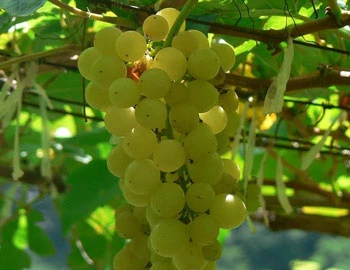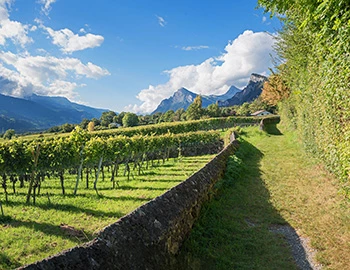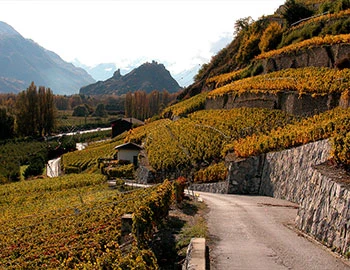Cuvée 1844 Chenin Blanc 2019
Ostschweizer Landwein, Roland und Karin Lenz, 750 ml

| Grape variety: | Chenin Blanc |
| Producer: | Roland und Karin Lenz |
| Origin: | Switzerland / Ostschweiz |
| Other vintages: |
Description
The Chenin Blanc grape is unquestionably one of the most diverse and underrated white wine varieties in the world of viniculture. Originally native to the Loire Valley in France, it has found a new home in the sunshine terrace of the Thurgau region, where superb white wines are produced from it. This pure Chenin Blanc variety offers a vast range of aromas: hawthorn and orange blossoms, star fruit, apple peel, cut grass, haystack and damp stone. It nestles harmoniously, almost creamy and yet with an exciting grip on the palate, while revealing itself as full-bodied, lively and juicy! An exciting, fruity-sweet bouquet of aromas including lemon grass, nectarine, candied ginger and dried apricot. Enjoy it to trout meunière, spicy finger food or green asparagus.
Attributes
| Origin: | Switzerland / Ostschweiz |
| Grape variety: | Chenin Blanc |
| Label: | Vegan, Certified organic or biodynamic wine |
| Ripening potential: | 1 to 5 years |
| Drinking temperature: | 10 to 12 °C |
| Food Pairing: | Fish terrine, Baked egli fillets with tartare sauce, Spicy hard cheese |
| Harvest: | hand-picking |
| Maturation: | partly in steel tank, partly in wooden barrel/foudre |
| Volume: | 11.5 % |
| Note: | Contains sulphites |
Chenin Blanc
Small area, great variety
The Chenin blanc now grows on just one percent of French vineyards. But its wines are immensely diverse. The homeland of this grape is the Loire Valley. There it muscles into the light-footed frothers of Saumur and Vouvray. The vintners of Bonnezeaux and Quarts-de-Chaume process them into beguilingly sweet wines. And in Savennières it yields dry whites with mineral cores and great aging potential. They smell of apple, honey and fresh straw, and show great body and a stimulating acidity. The world's largest area of Chenin blanc is in South Africa, where it landed in the mid-17th century with Dutch traders. The most exciting wines result from old vines drawn from traditional bush forms.

Ostschweiz
Eastern Switzerland: an intriguing puzzle
Eastern Switzerland has long been positioned on the northern rim of the climate zone where the cultivation of popular Swiss varieties is possible. Due to a warming climate, the vineyards of Aargau, Zurich, Schaffhausen, Thurgau and Graubünden are now in the zone where varieties such as Müller-Thurgau or Pinot Noir succeed excellently. But even long-established, almost-forgotten varieties such as Elbling, Räuschling and Completer are experiencing a renaissance.

Switzerland
Switzerland – A small country with enormous diversity
Switzerland is famous for its banks, watches, and cheese, but not necessarily for its wine. The Swiss didn't invent wine, but they have been extremely open and curious to it. Wine culture arrived in what is now modern Switzerland via several routes: from Marseilles to Lake Geneva and the Lower Valais region; from the Aosta Valley through the Great St. Bernard Pass to the rest of Valais; from the Rhone through Burgundy, across the Jura Mountains to Lake Constance; and from Lombardy to Ticino, and then on to Grisons.



